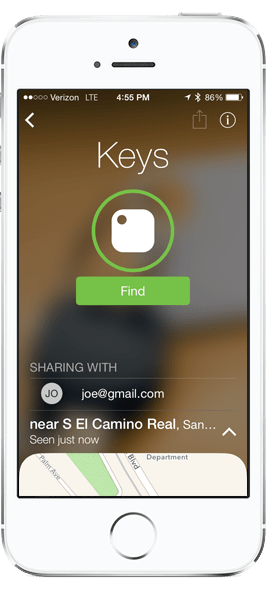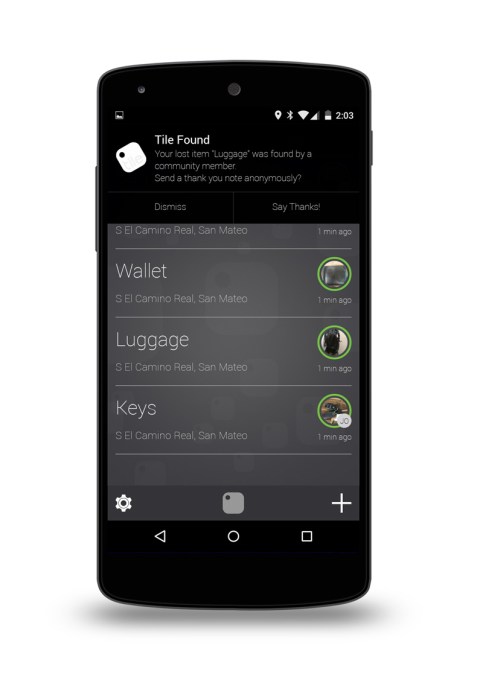Sensai Raises $900K To Help Data Scientists Query Unstructured DataTile, the lost item tracker that you can attach to purses, keys, luggage, bikes or anything else that tends to go missing at times, is today rolling out a new feature designed to make it easier for people to get help finding their items. In an update to the company’s iOS and Android applications, users will now be able to share their Tiles with others, including friends, family, roommates, or anyone else they choose in order to increase the chances that their Tile – and whatever it’s attached to – gets found.
The Tile tracker, by way of background, originally began as a crowdfunded device before raising $13 million in seed and Series A funding to fuel its growth. The company had sold over half a million of its small, white square-shaped devices as of last fall, but declined to provide any updated numbers today. Instead, CEO Mike Farley references a different metric: he says the Tile community is finding over 250,000 items every day.

That includes those who are using the Tile devices to locate lost items still in Bluetooth range, as well as those who leverage Tile’s larger network. The way the Tile works is that it’s able to tap into its community of users who have the company’s app installed on their smartphones in order to help people with missing items locate them, even when that item is no longer nearby.
However, relying on a network isn’t always as helpful as just asking a friend to help you find something. That’s where “Shared Tiles” comes in. Not only does it mean you can ask your own micro-community for help, it also means that a single Tile can be used among a group, too.
You may be out of town or just at the office, but someone else in your household or who you trust can help you find something you’ve lost just by installing the app on their phone. That way, couples can search together for missing keys, for example. Or if you go out of town, your roommates can still locate the remote that got lost in the sofa cushions, even though the Tile attached to it was originally associated only with your phone and account.
Lost items play a little melody while you’re hunting for them, which makes it easier to find them when misplaced.

The feature is a minor one for Tile’s app, but speaks to the company’s ability to make its hardware more usable by way of software upgrades. In the future, Farley says there are plans to do more with the software, too, including adding the ability for users to thank the strangers who helped them locate a lost item. He even hinted at the possibility of adding a “reward” option, which could encourage users to join in the lost item hunt for something of value to a Tile user.
But in the near future, Tile is focused on developing its business model which will involve a subscription-based business. Unlike a number of other lost item trackers, Tiles don’t include a user replaceable battery. That means your Tile will eventually stop working, but the decision to go this route was deliberate. Farley felt that users would simply abandon the devices after the battery dies – that it’s too much hassle to replace it. Plus, by eliminating the need to allow the Tile to open up, the design of the dongle can be improved, too.
So Tile’s goal instead will be to encourage users to sign up for a replacement program that would ship out new Tiles when the older ones near the end of their life.
Farley says details on how this program will work will arrive in the next couple of months.
But in the meantime, the company is having a little fun with its Tile community. Right now, Tile is hosting an Easter Egg hunt that uses the Tile app to find hidden eggs around San Francisco, one of which includes a $1,000 prize as a reward for its discovery. (The company’s Facebook page has more on this).
As for the new sharing feature, that’s arriving today in the Tile apps for both iOS and Android. (Note that the apps are being updated now on the respective app stores – if you don’t see the update yet, you should soon.)
The Tile tracker, by way of background, originally began as a crowdfunded device before raising $13 million in seed and Series A funding to fuel its growth. The company had sold over half a million of its small, white square-shaped devices as of last fall, but declined to provide any updated numbers today. Instead, CEO Mike Farley references a different metric: he says the Tile community is finding over 250,000 items every day.

That includes those who are using the Tile devices to locate lost items still in Bluetooth range, as well as those who leverage Tile’s larger network. The way the Tile works is that it’s able to tap into its community of users who have the company’s app installed on their smartphones in order to help people with missing items locate them, even when that item is no longer nearby.
However, relying on a network isn’t always as helpful as just asking a friend to help you find something. That’s where “Shared Tiles” comes in. Not only does it mean you can ask your own micro-community for help, it also means that a single Tile can be used among a group, too.
You may be out of town or just at the office, but someone else in your household or who you trust can help you find something you’ve lost just by installing the app on their phone. That way, couples can search together for missing keys, for example. Or if you go out of town, your roommates can still locate the remote that got lost in the sofa cushions, even though the Tile attached to it was originally associated only with your phone and account.
Lost items play a little melody while you’re hunting for them, which makes it easier to find them when misplaced.

The feature is a minor one for Tile’s app, but speaks to the company’s ability to make its hardware more usable by way of software upgrades. In the future, Farley says there are plans to do more with the software, too, including adding the ability for users to thank the strangers who helped them locate a lost item. He even hinted at the possibility of adding a “reward” option, which could encourage users to join in the lost item hunt for something of value to a Tile user.
But in the near future, Tile is focused on developing its business model which will involve a subscription-based business. Unlike a number of other lost item trackers, Tiles don’t include a user replaceable battery. That means your Tile will eventually stop working, but the decision to go this route was deliberate. Farley felt that users would simply abandon the devices after the battery dies – that it’s too much hassle to replace it. Plus, by eliminating the need to allow the Tile to open up, the design of the dongle can be improved, too.
So Tile’s goal instead will be to encourage users to sign up for a replacement program that would ship out new Tiles when the older ones near the end of their life.
Farley says details on how this program will work will arrive in the next couple of months.
But in the meantime, the company is having a little fun with its Tile community. Right now, Tile is hosting an Easter Egg hunt that uses the Tile app to find hidden eggs around San Francisco, one of which includes a $1,000 prize as a reward for its discovery. (The company’s Facebook page has more on this).
As for the new sharing feature, that’s arriving today in the Tile apps for both iOS and Android. (Note that the apps are being updated now on the respective app stores – if you don’t see the update yet, you should soon.)

